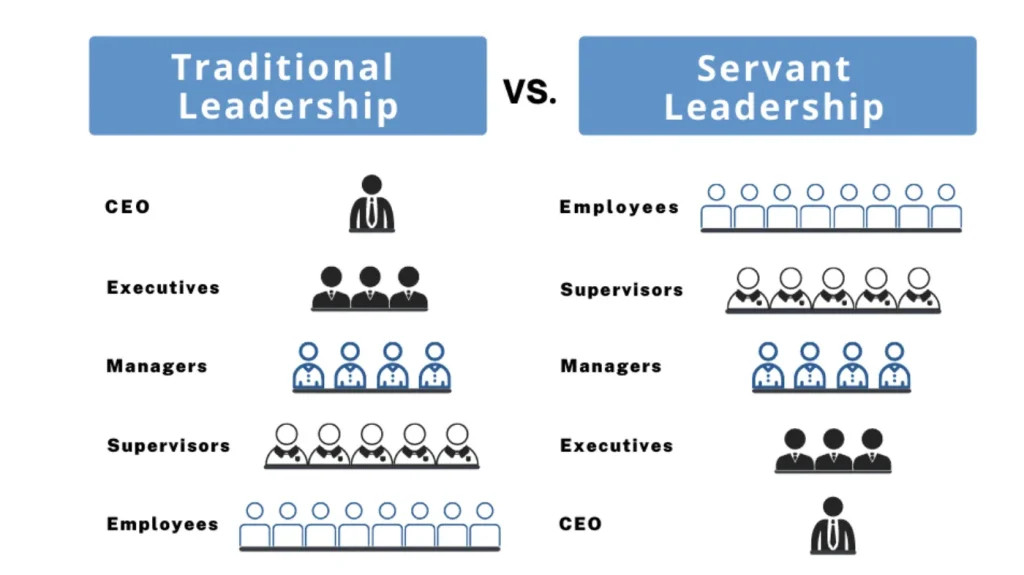In the ever-evolving business leadership landscape, servant leadership may effectively bridge the gap between employers and employees. Far from the traditional top-down model, servant leadership flips the script, emphasising a workplace culture where inclusivity, trust, and empowerment reign supreme.
We delve into the profound impact of embracing servant leadership, exploring how it can help propel your company toward organisational success in the new world of work.
What is servant leadership?
Servant leadership, coined by Robert K. Greenleaf in the 1970s, emphasises the leader’s role as a servant first. Instead of focusing solely on achieving organisational goals, servant leaders prioritise the needs and development of their employees.
The strong emphasis on uplifting employees is even more relevant today, where employees are increasingly seeking meaningful and fulfilling work experiences. In the current fast-paced and ever-changing work environment, employees desire leaders who are approachable, empathetic, and invested in their personal and professional growth.
Servant leaders share some traits with traditional leaders, but there are some key distinctions between the two. Traditional leadership has the boss at the top of the hierarchy — calling all the shots and controlling the rewards.
On the other hand, servant leaders put employees at the top of the typical company structure. Their actions are designed to support the needs of employees first and foremost.

Here are the ten principles of effective servant leadership:
1. Listening
Effective servant leaders prioritise listening over speaking, ensuring every employee has a chance to express themselves fully. They foster an environment of understanding and growth.
2. Empathy
Successful servant leaders demonstrate genuine care for their team members recognising the correlation between personal fulfilment and professional success.
3. Healing
Servant leaders address and resolve conflicts. Recognising the importance of reconciliation, they provide the necessary support and resources for team members to overcome setbacks and foster a conducive environment for growth.
4. Self-awareness
Effective servant leaders reflect on their emotions and behaviours, acknowledging and improving on their weaknesses. Additionally, they recognise and leverage the strengths and weaknesses of their team members to facilitate growth.
5. Persuasion
Servant leaders guide and persuade their team members through rationale and reasoning rather than directives. They seek consensus and collaboration, encouraging team members to understand the rationale behind decisions and fostering a sense of ownership.
6. Conceptualisation
Successful servant leaders can envision and communicate larger organisational goals. They inspire and motivate their teams by emphasising the significance of long-term objectives and fostering a sense of purpose.
7. Foresight
Servant leaders leverage past experiences to inform present decision-making and anticipate future outcomes. They encourage their teams to critically evaluate current situations, and plan using tools like SWOT analysis and SMART goals.
8. Stewardship
Effective servant leaders safeguard the trust and confidence of their employees. They lead by example, demonstrating accountability, reliability, and integrity in their actions and decisions.
9. Commitment to growth
Servant leaders are dedicated to fostering the professional development of their teams. They empower team members to become leaders themselves by providing opportunities for growth and offering support and mentorship.
10. Community Building
Successful servant leaders foster collaboration, and engagement and value the contributions of every team member. They foster a sense of belonging and shared shared purpose among team members.
What are the benefits of adopting servant leadership?
A recent study by the University at Buffalo revealed that the servant leadership style of management, directly impacts improved decision-making, resulting in increased profitability for the company.
Dollars and cents aside, working for a company where employees feel respected, appreciated and valued makes for a positive work environment. Below are some of the positive impacts that may arise from the adoption of servant leadership in the management of your company:
1. Enhanced employee engagement
By prioritising the development and well-being of employees, they will feel valued, respected, and motivated to contribute their best to the company’s success.
2. Improved performance
When employees work in a supportive environment where they are encouraged to take risks, learn from failures, and continuously improve, they will feel empowered and motivated and be more productive.
3. Better retention rates
Employees satisfied with their jobs are less inclined to seek opportunities elsewhere. Retaining talent is not only cost-effective but also contributes to the stability and continuity of the company.
4. Stronger company culture
Servant leadership promotes a culture of collaboration, empathy, and inclusivity. This fosters a sense of belonging and collective purpose among employees, strengthening the fabric of the company culture.
Business success isn’t just about profits
Embracing servant leadership isn’t just an executive choice; it’s a commitment to unlocking your company’s full potential. As you embark on this transformative journey, remember that true success isn’t measured solely by financial gains but by how you positively impact the lives of those you lead.
Dare to lead with empathy, inspire with purpose, and watch as your company thrives like never before.















